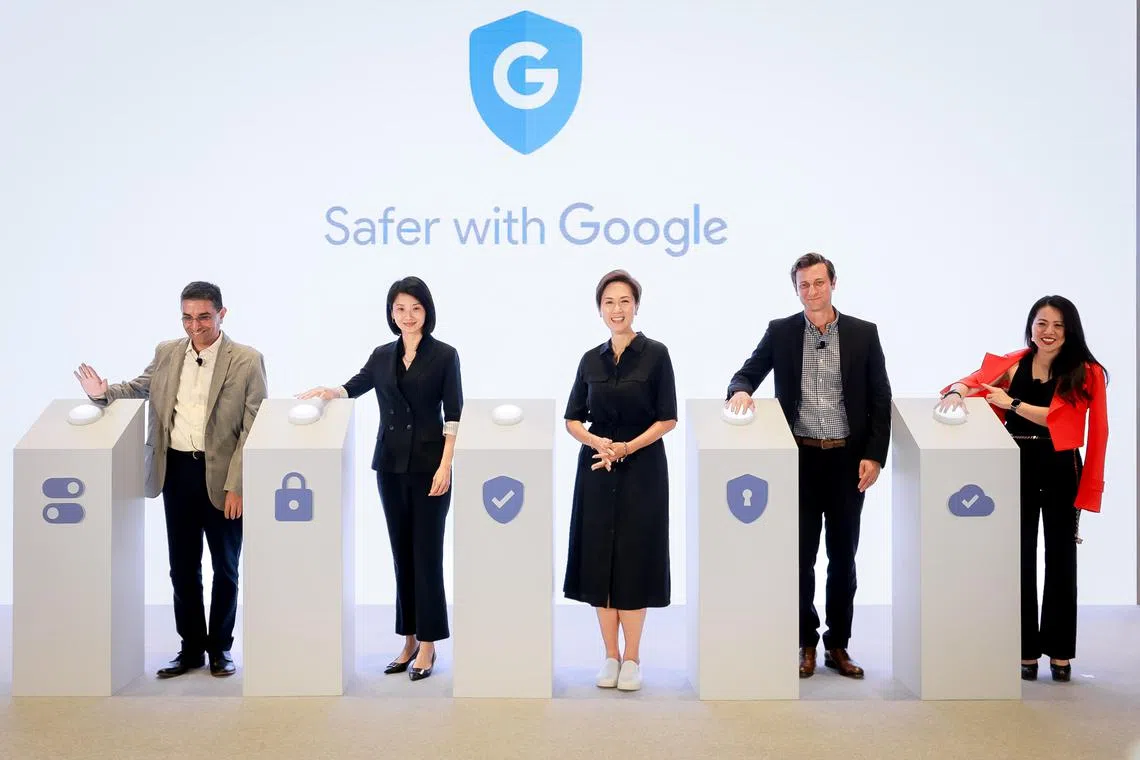4 social service groups to help flag harmful YouTube videos as Google launches priority reviewer scheme in S’pore
Sign up now: Get ST's newsletters delivered to your inbox

(From left) Regional director for YouTube Ajay Vidyasagar, Minister of State for Social and Family Development and Home Affairs Sun Xueling, Minister for Communications and Information Josephine Teo, Google Singapore managing director Ben King and Google Cloud’s country director for Singapore Sherie Ng.
ST PHOTO: GAVIN FOO
SINGAPORE - YouTube is adding extra eyes from social service outfits such as Samaritans of Singapore and Touch Community Services to flag harmful videos on the platform.
Content flagged by these community partners will be prioritised for review by Google, which runs YouTube.
Google will also train the volunteers on how to report online harms efficiently according to the platform’s guidelines.
The YouTube Priority Flagger Programme kicks off with four social service groups – Limitless, Samaritans of Singapore, SG Her Empowerment (SHE) and Touch Community Services – which Google announced on Friday at the Safer With Google conference held at its Mapletree Business City office.
The four partners join around 300 organisations worldwide that will work with YouTube, amid increasing calls to crack down on online content, especially those that could harm young users.
Regional director for YouTube Ajay Vidyasagar said the groups chosen have expertise in looking out for content related to child safety, cyber bullying, harassment, self-harm and suicide.
YouTube welcomes more organisations to join the network, he added.
Content flagged by these groups will land at the top of the pile to be reviewed by Google, which removed more than 35,000 videos in Singapore between January and March, said Mr Vidyasagar.
In that time, more than 6.4 million YouTube videos were taken down worldwide for violating its guidelines, he added. Google could not disclose the number of videos flagged to YouTube daily.
Content picked out by priority flaggers is not automatically removed and is subject to the same treatment as videos flagged by the public. “But, because of their high degree of accuracy, our teams prioritise flags from priority flaggers for review,” said Mr Vidyasagar.
A similar community flagging programme was also announced for partners to report potential phishing sites and malware hosted on Google’s network.
The Singapore Police Force is among its first priority flaggers.
Google Singapore managing director Ben King said that Google’s artificial intelligence and content moderators also keep watch over the platform, but “priority flaggers are experts in a particular category like scams or child abuse”.
“(They) become particularly important in helping us to localise and have the right approach in a particular country.”
Staff members from the Samaritans will help to look out for harmful content circulating on YouTube as part of their job, its chief executive Gasper Tan told The Straits Times, adding that its pool of 400 volunteers can also alert the charity if they spot a problematic video.
“Common flagged videos include graphic or explicit depictions, and are often highly distressing or triggering for vulnerable individuals,” said Mr Tan. “Being a part of this initiative has been a very easy decision.”
SHE chief executive Simran Toor said the partnership can speed up reviews of online harassment cases that it reports, protecting clients and other victims from further trauma. Her team regularly tends to victims of revenge pornography, long-term stalking and online harassment.
“Victims can come to us and we can now make a report to YouTube under the programme in a manner that gives the report the highest chance of success,” she said.
In her address at the Safer With Google event, Minister for Communications and Information Josephine Teo announced that the authorities will introduce a code of practice for online safety later in July.
The code will detail the responsibilities of social media services and the steps they need to take to keep users safe from harmful content. Community partners can also help to build a more resilient online space, she added.
Google also announced initiatives to raise awareness of scams and harmful online content, including a partnership with senior volunteer group RSVP Singapore to teach 2,000 seniors within a year to spot scams.
It will also double the number of parents and youth trained in online safety to 100,000 by 2024, in partnership with the Infocomm Media Development Authority and Media Literacy Council.
Along with the Cyber Security Agency of Singapore, Google will offer 5,000 places for cyber-security courses to address the growing demand for cyber-security talent.


